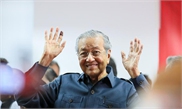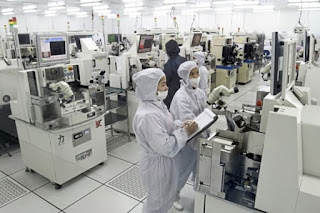Japan may have led Malaysia's Look East policy of yore, but the stakes are heavily tipped in China's favour now as the leader of the new world order.
PRIME Minister Tun Dr Mahathir Mohamad (pic) has announced that Malaysia is renewing, or to be more precise, upgrading the Look East policy he adopted as a foreign policy 30 years ago.
It was unveiled after he came to power in 1981 and now, as the premier for the second time, he has picked up the pieces of his past and repackaged it.
His inclination to Japan then was understandable since the country was the rising star of Asia.
Although Look East included South Korea and Taiwan, it basically meant Japan.
There were sound reasons to why Dr Mahathir wanted Malaysia to emulate some of the East Asian characteristics, both economically and ethically.
I think any Malaysian who has visited Japan can vouch for the people’s work ethic, honesty, orderliness, politeness, punctuality, cleanliness, precision, dedication to excellence, innovation and good manners.
Malaysians in Japan feel safe – they rarely get cheated despite being tourists, which is more than can be said for many countries.
Personally, Japan remains my No. 1 holiday destination. Like Dr Mahathir, I have the highest admiration for the Japanese. They are certainly exemplary, and that is indisputable.
Dr Mahathir has continued to have high regard for the Japanese and history seems to be repeating itself.
His Look East Policy shocked and confused the Malaysian foreign ministry, with many officials viewing it as undefined and vague.
The Ministry being left in the dark about the Prime Minister’s move led to it being unaware of how to implement the policy.
Fast forward to 2018. It’s likely that his new batch of ministers were also caught off guard with the revival of the Look East policy, more so when the Foreign Minister has yet to be installed.
Without doubt, Japan is an important partner to Malaysia because we have more than six decades’ ties with the country.
In 2016, Japan ranked Malaysia as its fourth-largest trading partner with bilateral trade standing at RM120bil.The strong trade and investment relations between the nations are also underpinned by the Malaysia-Japan Economic Partnership Agreement.
The latest Malaysia-Japan collaboration includes the Bukit Bintang City Centre project, which has managed to attract the leading real estate group in the Land of the Rising Sun, Mitsui Fudisan Co Ltd, to invest in what will be the mega project’s RM1.6bil retail mall.
But Dr Mahathir’s choice of his first foreign visit to Japan as PM has raised many eyebrows. Perhaps it was just the coincidental timing of the annual Nikkei Conference, which he attends without fail.
I was told that his office had informed the Chinese Embassy here, as a matter of courtesy, to avoid reading into the matter, given the long, bitter rivalry between the two nations.
Dr Mahathir was also visiting Japan after a series of announcements, calling for the review, if not cancellation or postponement, of several mega Chinese-driven projects in Malaysia.
The method of repayments with China, involving huge amounts of money, has, of course, been called into question and condemned. One critic even described the terms as “strange.”
It’s apparent the situation is delicate now, and we need to tread carefully because we are dealing with a global leader.
Powerful alliance
The PM admitted that his government was “dealing with a very powerful country. As such, matters affecting both parties will require friendly discussions”.
Former finance minister Tun Daim Zainuddin also said that Malaysia will carefully handle business contracts with China made by the previous administration.
In an interview with The Star, Daim admitted that the economic superpower is a friend to Malaysia.
“China is very important to us,” the Council of Eminent Persons spokesman said.
“We enjoy very close relations, but unfortunately, under the previous administration, a lot of China contracts are tainted, difficult to understand and the terms are one-sided,” said Daim.
There is plenty at stake here. The world has also changed, and Malaysia needs to be mindful of its diplomatic move. These are sensitive times, and to the Chinese, the issue of “face” is an important one.
Whether we like it or not, the whole world is looking towards China because this is where the fundamental building blocks of a future global digital economic model is being curated and built.
Japan’s economy, on the other hand, has been in regression over the last two decades, and open data is easily available to prove this point. Just google it.
That aside, China is Malaysia’s largest trading partner in Asean, especially after Malaysia-China bilateral transactions rose as much as 28% to RM139.2bil in 2017’s first half.
The Chinese government has been very positive with bilateral relations with Malaysia over the years, and this great foundation is what we must build on. It doesn’t matter who the Malaysian Prime Minister is now.
With Ali Baba and Tencent coming to Malaysia, SMEs – which comprise more than 95% of Malaysian business entities – exporting to China will be a huge foreign trade opportunity.
Of all the Asean nations, Malaysia has the largest pool of businessmen who speak the relevant Chinese dialects and understand the culture. But it’s not just the Malaysian Chinese businessmen who stand to benefit, but other races too.
Let’s not forget that China will be under steady stewardship for the coming decade since Xi Jinping has strengthened his position as the premier. And with Dr Mahathir rightfully announcing that Malaysia will be a neutral country, this will mean a stable foreign policy which is crucial for the rules of engagement.
The same can’t be said of Japan, though, as it has a history of turbulent domestic politics, with frequent changes in leadership.
Truth be told, China has outperformed Japan. The republic has become a model of socio-economic reform that connects, not only the past with the present, but more importantly, can rewrite the history of human development into our common future.
The One Belt, One Road initiative is the future. It was also reported that China has overtaken Japan in global patent applications filed in 2017 and is closing in on the United States, the long-standing leader, the World Intellectual Property Organization said in a report.
With 48,882 filings, up 13.4% from a year earlier, Chinese entities came closer to their American counterparts, which filed 56,624 applications. Japanese applicants ranked third with 48,208 demands for patents, up 6.6% from a year ago, the report, released Wednesday, revealed. According to the Geneva-based institution, China will likely overtake the US as the world’s largest patent applicant within three years.
“This rapid rise in Chinese use of the international patent system shows that innovators there are increasingly looking outward, seeking to spread their original ideas into new markets as the Chinese economy continues its rapid transformation,” WIPO director-general Francis Gurry said.
The overall filings in 2017 were 243,500, up 4.5% from a year earlier.
Data indicates that China and Japan were key drivers of the surge in applications.
“This is part of a larger shift in the geography of innovation, with half of all international patent applications now originating in East Asia,” Gurry reportedly said.
Two Chinese firms topped the list, led by Huawei Technologies Co with 4,024 patent applications and ZTE Corp with 2,965 submissions. Intel Corp of the United States is placed third with 2,637 filings, followed by Mitsubishi Electric Corp with 2,521.
China has also declared its ambition to equal the US in its AI capability by 2020 and to be number one in the world by 2030.
If there is a single country to take a cue from, then it can only be China. Look at its growth since 1957, 1967, 1987, 1997 and 2017, and see the strides it has made in the shortest time. Remember, China was once poor and backwards. Many Malaysian Chinese used to send money back to their families in China, especially in 1950s and 1960s, and even 1970s. But look where the country is now.
Malaysia is in pole position to take advantage since our neighbour Singapore has always been perceived to be too US-centric. It will be a waste if we let politics get in the way, as no one can dispute that China now plays a respected and vital role.
Anyone can tell that China will reshape the new world order. It is the new Middle Kingdom and is the country to look to.
And Dr Mahathir should pick up on this because at the end of his trip to Japan, the press bombarded him with the predictable and nagging question – when will he be visiting China?
By Wong Chun Wai On The Beat
Wong Chun Wai began his career as a journalist in Penang, and has served The Star for over 27 years in various capacities and roles. He is now the group's managing director/chief executive officer and formerly the group chief editor.
On The Beat made its debut on Feb 23 1997 and Chun Wai has penned the column weekly without a break, except for the occasional press holiday when the paper was not published. In May 2011, a compilation of selected articles of On The Beat was published as a book and launched in conjunction with his 50th birthday. Chun Wai also comments on current issues in The Star.
Related Links:
KUALA
LUMPUR: The Multimedia Super Corridor (MSC) programme, mooted by Prime
Minister Tun Dr Mahathir Mohamad some 20 years ago, has been
instrumental in inspiring the establishment of Alibaba Group, Jack Ma
said.


Related Posts: :

Illustration: Liu Rui/GT Newly-elected
Malaysian Prime Minister Mahathir Mohamad has decided to scrap the Kuala
Lumpur-Singapore Rail...






























